|
|
|
Sort Order |
|
|
|
Items / Page
|
|
|
|
|
|
|
| Srl | Item |
| 1 |
ID:
188038
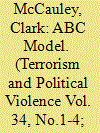

|
|
|
|
|
| Summary/Abstract |
In this commentary, I compare the ABC model of radicalization with the Two Pyramids model of radicalization. Both models distinguish radicalization of opinion from radicalization of action. Beyond this agreement are questions about the concepts deployed in advancing the ABC model and research issues relating to applications of the two models. I conclude with an optimistic assessment of recent progress in research on terrorism, including the suggestion that deradicalization of action may be forwarded by giving up on deradicalization of opinion.
|
|
|
|
|
|
|
|
|
|
|
|
|
|
|
|
| 2 |
ID:
092397


|
|
|
|
|
| Publication |
2009.
|
| Summary/Abstract |
The continued decline in levels of political engagement among British citizens has led many politicians, commentators and academics from across the political spectrum to advocate a move toward a more direct form of democracy via some kind of localism. The claim is that citizens feel increasingly estranged from the democratic process, and from those organisations on which they have historically relied to represent them within the political system. Consequently, localists argue, there now exists a gap between the people, the institutions which are supposed to work on their behalf, and the decisions made in their name, so the system needs to be reformed in such a way as to give individuals and local communities more of a direct input into the decision-making process. Calls for a more direct form of democracy via localism are popular among members of the progressive left and the 'new Conservative' right, and have become so dominant in political discourse that it is often suggested that 'we are all localists now'. This article raises questions about the localist agenda, and suggests that the adoption of a more direct form of democracy in Britain may not only fail to address the decline in political engagement, but may also result in the exclusion, marginalisation, and oppression of minority groups
|
|
|
|
|
|
|
|
|
|
|
|
|
|
|
|
| 3 |
ID:
188037


|
|
|
|
|
| Summary/Abstract |
Progress in understanding and responding to terrorism and violent extremism has continued to stall in part because we often fail to adequately conceptualize the problem. Perhaps most notably, much of our terminology (for instance, “radicalization”) and many variants of our existing models and analogies (including conveyor belts, staircases and pyramids) conflate sympathy for this violence with involvement in its creation. As its name suggests, the Attitudes-Behaviors Corrective (ABC) model seeks to overcome this issue by placing this key disconnect between attitudes and behaviors at its core. In this paper, we first present the key elements of our model, which include a graphic representation of this disconnect and a classification system of the drivers of violent extremism. The former enables us to track the trajectories of individuals in relation to both their attitudes and behaviors, while the latter helps ensure that we consider all potential explanations for these movements. We then adapt these elements to focus on exit from violence, applying the dual concepts of disengagement and deradicalization. Finally, we conclude with a section that aims to provide the research community and those tasked with preventing and countering violent extremism with practical benefits from the ABC model.
|
|
|
|
|
|
|
|
|
|
|
|
|
|
|
|
| 4 |
ID:
105991


|
|
|
|
|
| Publication |
2011.
|
| Summary/Abstract |
Recently many scholars have focused their attention on the dynamics of radicalization, de-radicalization, and disengagement, yet most studies are based on indirect and/or data which is difficult to verify. An exception comes from Italy, where authorities have recently benefited from the insights of two former members of an al Qaeda-affiliated Tunisian network. The two have voluntarily described to authorities the process and factors that led them to their radicalization and encouraged them to abondon the network. Based on thousands of pages of their unpublished confessions, the article provides a case study of radicalization that is rich in detail and uniquely reliable.
|
|
|
|
|
|
|
|
|
|
|
|
|
|
|
|
| 5 |
ID:
156017


|
|
|
| 6 |
ID:
068771
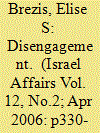

|
|
|
| 7 |
ID:
146856
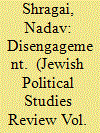

|
|
|
|
|
| Contents |
The disengagement and its disappointments have been part of public discourse in Israel for the past decade. Among the topics are: “Hamastan”; the nine thousand uprooted settlers; the 11,600 rockets fired at Israel and the eight military operations which followed. Nevertheless, an essential question remains unanswered: did Prime Minister Ariel Sharon implement this plan because he genuinely believed in it or were his motives based upon self-interest? Was his real aim to extricate himself from the criminal investigations against him? There are several schools of thought which have attempted to explain what ultimately led the prime minister to make this crucial decision. On the one hand, some, such as Defense Minister Moshe Ya’alon, believe that Sharon was motivated by “external considerations and personal distress,” and former Member of Knesset Zvi Hendel still contends that it was the investigations that led to the evacuation of the Gaza Strip. On the other hand, Dov Weisglass [occasionally spelled “Weissglass”], director of Sharon’s office, and Eyal Arad, Sharon’s strategic adviser, argue that such allegations are baseless and false. The purpose of this article is to present and review the opposing perspectives regarding the motivation for Sharon’s decision. Based on the available evidence, the author concludes that it is not possible to offer a definitive and unequivocal answer. However, it is important to present the differing views as they help us appreciate the diversity of vantage points involved both in making the decision and in the subsequent analysis of the disengagement.
|
|
|
|
|
|
|
|
|
|
|
|
|
|
|
|
| 8 |
ID:
152872
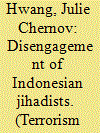

|
|
|
|
|
| Summary/Abstract |
While much research has been conducted on the radicalization of Muslim militants from Jemaah Islamiyah, its spinoffs, and splinter factions; the historical roots of Indonesian radical movements; and their ideological underpinnings, far less analysis has centered on how and why individual militants may come to disengage from violence. Disengagement is defined as a gradual process through which a member of a terror group, radical movement, gang, or cult comes to reject the use of terror methods in pursuit of their goals. Utilizing original fieldwork conducted between 2010 and 2014, with fifty current and former members of Islamist extremist groups in Indonesia, this article will unpack the patterns, pathways, religious considerations, and psychological processes that propel individual militants to turn away from violence.
|
|
|
|
|
|
|
|
|
|
|
|
|
|
|
|
| 9 |
ID:
123219


|
|
|
|
|
| Publication |
2013.
|
| Summary/Abstract |
To what extent are jihadists in Indonesia disengaging from violence? Based on original fieldwork in Jakarta and Central Sulawesi, including interviews with 23 current and former Poso-based jihadists, we examine the emotional, psychological, rational, and relational factors that can lead militants to turn away from terror tactics.
|
|
|
|
|
|
|
|
|
|
|
|
|
|
|
|
| 10 |
ID:
188100


|
|
|
|
|
| Summary/Abstract |
Why do rebels leave rebellions? Although much scholarly attention has been devoted to understanding why individuals join rebellions, relatively little is known about why they leave. This paper seeks to fill this deficit by exploring the decision-making process that rebels undertake when determining whether to stay or leave. Based on interview data collected from ten active rebels and four former rebels all engaged (or previously engaged) in conflicts in East Africa, we find that the reason why rebels joined the group influences their decision to leave or stay. Rebels who joined due to grievances are far less likely to escape opportunistically, while rebels who joined due to “greed” display a higher sensitivity to the hardships of rebel life and the pull of alternative options. Understanding why a person joins a rebellion helps predict the factors that will drive them to leave.
|
|
|
|
|
|
|
|
|
|
|
|
|
|
|
|
| 11 |
ID:
130582


|
|
|
|
|
| Publication |
2014.
|
| Summary/Abstract |
This study incorporates teacher and child perceptions of child school experiences into the examination of the reciprocal influence between teacher and child educational expectations and child academic achievements. Analysing a longitudinal data from north-west rural China, the results highlight strong lagged effects of child school experiences: a child's early feelings of disengagement have strong negative impact on his/her later educational expectations and achievements, while the teacher's early evaluations of the child are closely linked to later teacher expectations and child achievement. A child's family background has almost no direct effect on child and teacher expectations and achievements when controlling child and teacher perceptions of child's progress in school. The findings suggest that future studies should focus more on child school experiences, which is a topic that has brought much insight to disparities in educational outcomes in developed countries
|
|
|
|
|
|
|
|
|
|
|
|
|
|
|
|
| 12 |
ID:
146858
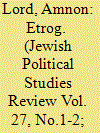

|
|
|
|
|
| Contents |
This article describes the protection and favor that the media and the courts extended to Prime Minister Ariel Sharon from the moment that he announced the disengagement plan in December 2003 up to and after the withdrawal from Gaza and part of northern Samaria in August 2005. Senior journalist and commentator, Amnon Abramovich pioneered the idea of treating the prime minister like an “etrog” (the citron which is blessed during the Feast of Tabernacles [Sukkoth]) and stored in cotton and gauze. This gentle handling enabled Sharon to carry out the evacuation of settlements and escape criminal investigations. The media thus shifted from reporting and commenting on events to becoming a supporter of the reversal of Sharon’s stated policy by delegitimizing opponents of the disengagement and preventing the public debate. Amnon Lord, currently a columnist of the weekly Makor Rishon and an editor of the Hebrew website, Mida, describes the ‘group-think’ mentality of many Israeli journalists and commentators and discusses the frequently deleterious role of the media in dictating the public agenda. In this process, the media found willing partners in the legal system which harmed democracy in Israel.
|
|
|
|
|
|
|
|
|
|
|
|
|
|
|
|
| 13 |
ID:
191034


|
|
|
|
|
| Summary/Abstract |
There currently exists little evidence on the effectiveness of case-managed programs targeting radicalised individuals. This paper provides results from an evaluation of two case-managed interventions implemented by police in Australia, referred to as Intervention 1 and Intervention 2. Drawing on client case note data and interviews, the paper provides quantitative and qualitative results. It examines client change using a five-point metric and details two individual case studies. Results provide data on radicalised behaviours, intervention goals and services offered to clients. Individual client progress is explored, and the overall effectiveness of both programs examined. The results show a positive relationship between client change and different measures of engagement. Limitations of the evaluation methodology and data sources are acknowledged and addressed. Lessons are highlighted relating to the assessment of client change, program evaluation and the role of interventions in supporting disengagement.
|
|
|
|
|
|
|
|
|
|
|
|
|
|
|
|
| 14 |
ID:
109143


|
|
|
|
|
| Publication |
2011.
|
| Summary/Abstract |
Terrorists disengage from the groups or organizations to which they belong as a result of structural, organizational, or personal factors. These types of factors seem to operate with relative mutual independence. All this can be analytically induced from research conducted at an individual level of analysis, based on 35 long interviews with former members of ETA who voluntarily decided to conclude their militancy at some point between 1970 and 2000. Until the mid-1980s, the individual decision to leave ETA tended to be linked to a subjective perception of ongoing political and social changes. From then on, disagreement with the internal functioning of the ethno-nationalist terrorist organization or the tactics adopted by its leaders became more salient motivations for those militants who decided to walk away. All along, however, there were ETA members who left terrorism behind for reasons of a rather personal nature. As expected, in this qualitative empirical study, disengagement was found to be a process seldom concomitant to that of deradicalization.
|
|
|
|
|
|
|
|
|
|
|
|
|
|
|
|
| 15 |
ID:
173737
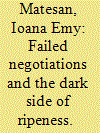

|
|
|
|
|
| Summary/Abstract |
This article revisits ripeness theory and examines whether conflicts with armed Islamist groups can also be ripe for negotiation. The article argues that armed Islamist organizations can be willing to negotiate and demobilize, but talks are particularly vulnerable to spoilers and public backlash. To examine these dynamics, the article investigates the case of al-Gama’a al-Islamiyya in Egypt. Relying on a variety of primary and secondary sources, including organizational documents and testimonies by the leaders, the analysis shows that the absence of ripeness can indeed explain some of the failures of negotiations. However, when the conflict was finally ripe, talks broke down because of elite divisions and public backlash. The case reveals that there is a dark side to ripeness: the conditions that lead to a mutually hurting stalemate can also lead to public outrage, elite divisions, and opposition to negotiations.
|
|
|
|
|
|
|
|
|
|
|
|
|
|
|
|
| 16 |
ID:
170067


|
|
|
|
|
| Publication |
India, Penguin Random House, 2020.
|
| Description |
xi, 385p.hbk
|
| Standard Number |
9780670093755
|
|
|
|
|
|
|
|
|
|
|
|
Copies: C:1/I:0,R:0,Q:0
Circulation
| Accession# | Call# | Current Location | Status | Policy | Location |
| 059799 | 327.73054/MAD 059799 | Main | On Shelf | General | |
|
|
|
|
| 17 |
ID:
134443


|
|
|
|
|
| Summary/Abstract |
Utilizing interviews with former Irish Republican Army (IRA) members, Loyalists, and community workers, the article looks at how militants in Northern Ireland have helped to prevent terrorism and political violence (TPV) by adopting roles in the community. By using mobile phones, a network of former combatants emerged around interface areas in the late 1990s to contain trigger causes of terrorism, providing a unique role that the state could not. The structure of the network encouraged militant groups to follow the IRA's example to disengage—thus creating a domino effect—and the co-operation between senior militants has limited the opportunities for other groups to mobilize a campaign of terrorism.
|
|
|
|
|
|
|
|
|
|
|
|
|
|
|
|
| 18 |
ID:
068817
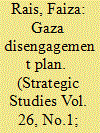

|
|
|
| 19 |
ID:
069025
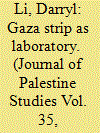

|
|
|
| 20 |
ID:
111498


|
|
|
|
|
| Publication |
2012.
|
| Summary/Abstract |
This article offers an overview of levels of party membership in European democracies at the end of the first decade of the twenty-first century and looks also at changes in these levels over time, comparing party membership today with figures from both 1980 and the late 1990s. While relying primarily on the direct and individual membership figures as reported by the parties themselves, the fit of the data with survey data is explored and it is concluded that the two perform well in terms of convergent validity. The differences between large and small democracies are examined, as well as old and new democracies, and it is found that levels of party membership are related to both the size and age of the democratic polity in question. Finally, the implications of the patterns observed in the membership data are discussed, and it is suggested that membership has now reached such a low ebb that it may no longer constitute a relevant indicator of party organisational capacity.
|
|
|
|
|
|
|
|
|
|
|
|
|
|
|
|
|
|
|
|
|